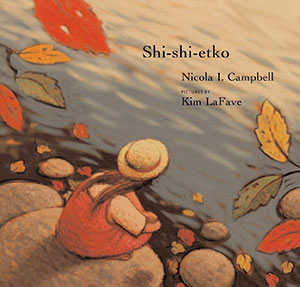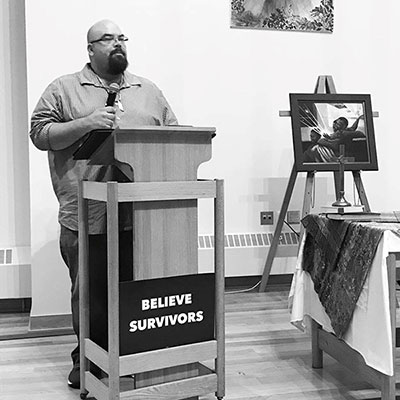Welcome to Peace-ology. We are two children’s authors teaming up to review children’s books with peace in mind.
Ellie: The other day, I looked over the shoulder of my five-year-old to see what he was drawing. There was the Ireland flag on the left, the Norway flag on the right, and he was finishing the United States flag in the middle. Simon was born on the day his great grandmother died. He has always been curious about his ancestors. When my spouse’s extended family sings the Norwegian table prayer in harmony, Simon joins in enthusiastically. I love feeding this curiosity of his in part because I believe we need to know where we come from and where we are currently standing to move toward a peaceful future.
 In raising peacemakers capable of reconciliation, I have committed to filling our house with books written by and about Native people so my children will know the history of the land we inhabit. One of our current favorites is Shi-Shi-Etko by Nicola L. Campbell. Shi-Shi-Etko (Groundwood Books) tells the story of a girl spending her last four days with her family before being taken away to a residential school. Her extended family fill her mind and heart with memories, knowledge and love so she will not forget where she came from. She visits the woods, the river and the creek, gathering bits of nature to take with her. It is tragic and beautiful. The stunning images pair well with the poetic words, both infusing our hearts.
In raising peacemakers capable of reconciliation, I have committed to filling our house with books written by and about Native people so my children will know the history of the land we inhabit. One of our current favorites is Shi-Shi-Etko by Nicola L. Campbell. Shi-Shi-Etko (Groundwood Books) tells the story of a girl spending her last four days with her family before being taken away to a residential school. Her extended family fill her mind and heart with memories, knowledge and love so she will not forget where she came from. She visits the woods, the river and the creek, gathering bits of nature to take with her. It is tragic and beautiful. The stunning images pair well with the poetic words, both infusing our hearts.
The book has led to questions about native plants, language, Native people, and our own ancestors. It has fed the curiosity of my children and opened up room to talk about where we came from and where we live. As peacemakers, we must know the history of our land. We must name that residential schools happened, and name how we all lost out because of it. We are challenged to learn our own ancestral histories, celebrate them, and create space for others to do the same.

Recently the name of a lake by my home was changed from Lake Calhoun to Bde Maka Ska. My mother-in-law drives by it with my boys on her way to drop them off back home. If she ever calls it the old name, my son corrects her. We are slowly creating space for the history and ancient culture of our land to breathe and make us better.
Find other great Native books.
Scene on Radio, a podcast out of Duke University, is one of my favorites. I recommend all their work, especially Season 2: Seeing White. Season 4 is about the history of democracy in our country. Episode 1 of Season 4 starts with the Cherokee, and how they were and are arguably more democratic than the Founding Fathers.

Caren: Digging Deeper. Ellie, knowing our own history and acknowledging and appreciating the history of others is critical to building peace. I’m reminded of a talk I attended with Jim Bear Jacobs, a Minnesotan, member of the Stockbridge-Munsee Mohican Nation, and recognized Twin Cities cultural facilitator. Jim Bear’s mission is dedicated to strengthening relationships between Native and non-Natives by the telling of healing stories (Healing Minnesota Stories) and the compassionate teaching of history. The focus of his talk that November day was Thanksgiving, the holiday’s history and myth making. To begin, Jim Bear introduced himself by acknowledging generations of his ancestors. He knew their names, where they lived, their place within his family and tribe. I wondered how many of us could do the same. We tried, but none of us in the audience had as an extensive family history committed to memory as Jim Bear. The reverence for family history as Jim Bear so clearly modeled challenged each of us to reach back to our own with the same respect. The simple act of reverence and respect brought an audience of individuals into a circle of one.
Ellie and Caren: Questions Toward Action
Who are the story tellers in your family? What language(s) did your ancestors speak? What words, recipes, practices, folklore or celebrations are part of your own history and place? What words remind you of your childhood or feel like home? What have we discovered about ourselves that we can share with others?
Don’t Sell Picture Books Short!
Picture books are for all ages. As writers, parents, and teachers, we both have learned so much so quickly by pulling from the nonfiction picture book section of the library. We’ve used picture books in classrooms, not only for young students, but with teenagers, as poetic illustrative models, samples of writing constructs and story structure, or story truths for their literal minds. The pithy nature of picture books can get to the heart of the matter and lead to rich discussions that take us to new places together.
Let us know:
Do you have children’s books or ideas with peace themes you’d like to share? Please do. We would like to incorporate your recommendations into upcoming articles, and of course, acknowledge you. Let’s create Peace-ology together. Write to either of us and describe your suggestion. Include your name, contact, and professional or organizational affiliation and send to www.ellieroscher.com or www.carenstelson.com .
We look forward to being on this peace journey together.
